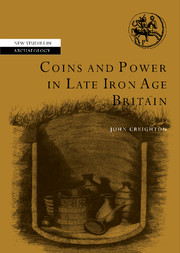Book contents
- Frontmatter
- Contents
- List of figures
- List of tables
- Preface
- Acknowledgements
- List of abbreviations
- Note on translations used
- Introduction
- 1 The Middle to Late Iron Age transition
- 2 Coin and the representation of individual authority
- 3 The Southern and Eastern kingdoms
- 4 Classical imagery and ideology in Britain
- 5 The location of Britain in the Roman world
- 6 Legends and language
- 7 Dynasties and identities
- 8 Conclusion and epilogue: from Britain to Britannia
- Appendix: A brief introduction to Iron Age coinage in Britain
- References
- Index of coin types
- General index
- NEW STUDIES IN ARCHAEOLOGY
5 - The location of Britain in the Roman world
Published online by Cambridge University Press: 22 September 2009
- Frontmatter
- Contents
- List of figures
- List of tables
- Preface
- Acknowledgements
- List of abbreviations
- Note on translations used
- Introduction
- 1 The Middle to Late Iron Age transition
- 2 Coin and the representation of individual authority
- 3 The Southern and Eastern kingdoms
- 4 Classical imagery and ideology in Britain
- 5 The location of Britain in the Roman world
- 6 Legends and language
- 7 Dynasties and identities
- 8 Conclusion and epilogue: from Britain to Britannia
- Appendix: A brief introduction to Iron Age coinage in Britain
- References
- Index of coin types
- General index
- NEW STUDIES IN ARCHAEOLOGY
Summary
Introduction
The previous chapter demonstrated that there is a strong congruence between the political imagery of the Augustan revolution and the imagery on British coin. It corroborates the idea that the sons of British kings may have been brought up in Rome, as were other obsides recorded in the Roman annals. This chapter seeks to explore the impact this experience could have had on the impressionable mind of a child. Before their departure to the big city, they would have learnt something of how their peers viewed the world around them. Stories and repeated practices would have taught them something of Iron Age British cosmology. Yet on their arrival in Rome, whilst some of these beliefs could possibly have been accommodated, many others would appear totally alien in a classical context. I want to explore this inevitable conflict between cosmologies that would have raged in the minds of these children, taken away from their circular hearth and home, and transported to the rectilinear world of Rome. They would have had to assimilate and cope with the conflicts between belief systems as British and classical cosmologies collided.
The evidence for a clash of cultures in the minds of people who died two thousand years ago is of course going to be tenuous, but two areas can be explored. First, certain aspects of Graeco-Roman myth appear on British coin which were outside the repertoire of Augustan imagery, and this can be understood in terms of a particular British reading of classical myth.
- Type
- Chapter
- Information
- Coins and Power in Late Iron Age Britain , pp. 126 - 145Publisher: Cambridge University PressPrint publication year: 2000



